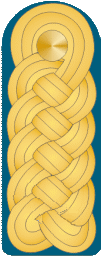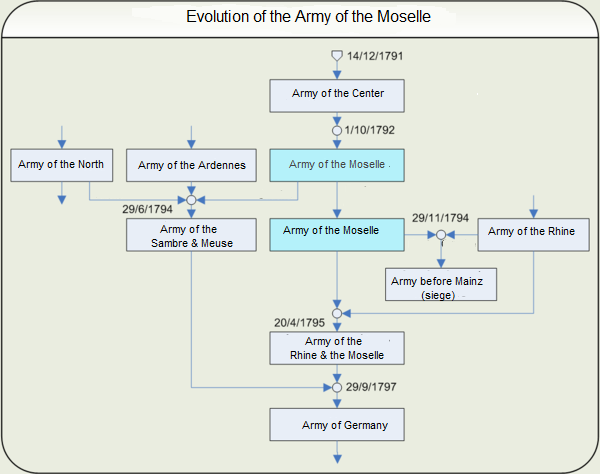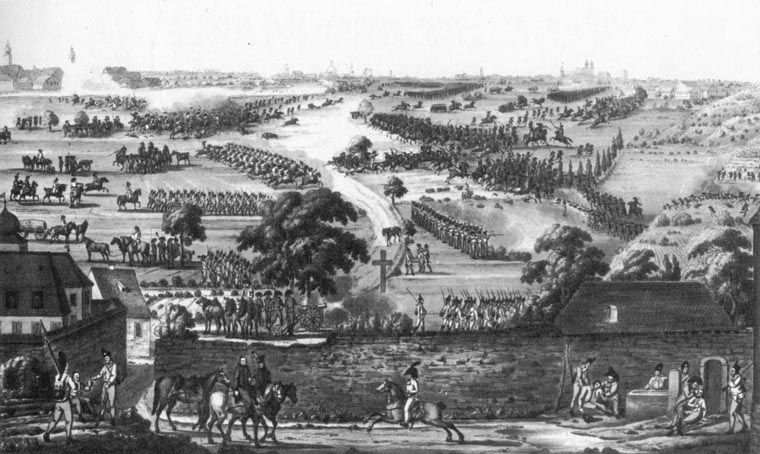|
Jean-Baptiste Olivier
Jean-Baptiste Olivier (25 December 1765 – 27 September 1813) enlisted in the French Royal Army as foot soldier in 1781. During the French Revolutionary Wars he was promoted general of brigade, fighting at Kaiserslautern, Fleurus, and Neuwied. He famously observed the action at Fleurus from a hot air balloon. In 1799 he transferred to the Army of Naples as a general of division. He fought at the Trebbia where he was severely wounded, losing a leg. During the Napoleonic Wars he held military commands in the interior and was appointed Baron of the Empire and Grand Officer of the Légion d'honneur. He died in 1813. Olivier is one of the names inscribed under the Arc de Triomphe. Early career Olivier was born on 25 December 1765 at Strasbourg, France. He enlisted in the ''Aquitaine'' Infantry Regiment in December 1781, the same unit in which his father had served. The ''Aquitaine'' Regiment was later numbered the 35th Regiment. Olivier received promotion to corporal on 1 January 178 ... [...More Info...] [...Related Items...] OR: [Wikipedia] [Google] [Baidu] |
Strasbourg
Strasbourg (, , ; german: Straßburg ; gsw, label=Bas Rhin Alsatian, Strossburi , gsw, label=Haut Rhin Alsatian, Strossburig ) is the prefecture and largest city of the Grand Est region of eastern France and the official seat of the European Parliament. Located at the border with Germany in the historic region of Alsace, it is the prefecture of the Bas-Rhin department. In 2019, the city proper had 287,228 inhabitants and both the Eurométropole de Strasbourg (Greater Strasbourg) and the Arrondissement of Strasbourg had 505,272 inhabitants. Strasbourg's metropolitan area had a population of 846,450 in 2018, making it the eighth-largest metro area in France and home to 14% of the Grand Est region's inhabitants. The transnational Eurodistrict Strasbourg-Ortenau had a population of 958,421 inhabitants. Strasbourg is one of the ''de facto'' four main capitals of the European Union (alongside Brussels, Luxembourg and Frankfurt), as it is the seat of several European insti ... [...More Info...] [...Related Items...] OR: [Wikipedia] [Google] [Baidu] |
General Of Division
Divisional general is a general officer rank who commands an army division. The rank originates from the French (Revolutionary) System, and is used by a number of countries. The rank is above a brigade general, and normally below an army corps general. The rank is mostly used in countries where it is used as a modern alternative to a previous older rank of major-general or lieutenant-general. Specific countries Brazil The Brazilian rank ''general-de-divisão'' translates literally as "general of division", and is used by the army. This rank is equivalent to lieutenant-general. The air force equivalent is ''major-brigadeiro''(literally "major-brigadier"). The navy equivalent is ''vice-almirante'' (literally, vice-admiral) Chile The Chilean rank ''general de división'' translates literally as "general of division", and is used by the army. This rank is equivalent to lieutenant-general. The air force equivalent is ''general de aviación'' (literally "aviation general"). Thes ... [...More Info...] [...Related Items...] OR: [Wikipedia] [Google] [Baidu] |
Jean-Baptiste Jourdan
Jean-Baptiste Jourdan, 1st Count Jourdan (29 April 1762 – 23 November 1833), was a French military commander who served during the French Revolutionary Wars and the Napoleonic Wars. He was made a Marshal of the Empire by Emperor Napoleon I in 1804. He was also a Jacobin politician during the Directory phase of the French Revolution, serving as member of the Council of Five Hundred between 1797 and 1799. One of the most successful commanders of the French Revolutionary Army, Jourdan is best remembered in the Revolution for leading the French to a decisive victory over the First Coalition at the Battle of Fleurus, during the Flanders campaign. Under the Empire he was rewarded by Napoleon with the title of Marshal and continued to hold military assignments, but suffered a major defeat at the Battle of Vitoria, which resulted in the Empire's permanent loss of Spain. In 1815 he became reconciled with the Bourbon Restoration, and later supported the July Revolution and served in ... [...More Info...] [...Related Items...] OR: [Wikipedia] [Google] [Baidu] |
Army Of The Moselle
The Army of the Moselle (''Armée de la Moselle'') was a French Revolutionary Army from 1791 through 1795. It was first known as the ''Army of the Centre'' and it fought at Valmy. In October 1792 it was renamed and subsequently fought at Trier, First Arlon, Biesingen, Kaiserslautern, Froeschwiller and Second Wissembourg. In the spring of 1794 the left wing was detached and fought at Second Arlon, Lambusart and Fleurus before being absorbed by the ''Army of Sambre-et-Meuse''. In late 1794, the army captured Trier and initiated the Siege of Luxembourg. During the siege, the army was discontinued and its divisions were assigned to other armies. History Originally known as the ''Army of the Centre'', it was renamed by decree of the National Convention on 1 October 1792 and kept under that name in the decrees of 1 March and 30 April 1793. By the decree of 29 June 1794 its left wing joined with the ''Army of the Ardennes'' and the right wing of the ''Army of the North'' to form the ... [...More Info...] [...Related Items...] OR: [Wikipedia] [Google] [Baidu] |
Lazare Hoche
Louis Lazare Hoche (; 24 June 1768 – 19 September 1797) was a French military leader of the French Revolutionary Wars. He won a victory over Royalist forces in Brittany. His surname is one of the names inscribed under the Arc de Triomphe, on Column 3. Richard Holmes describes him as "quick-thinking, stern, and ruthless... a general of real talent whose early death was a loss to France." Early life Hoche was born on 24 June 1768 in the village of Montreuil, today part of Versailles, to Anne Merlière and Louis Hoche, a stable servant of the king. His mother died when he was two years old, and Hoche was mostly raised by an aunt, who was a fruit-seller in Montreuil, and was educated by the Abbé Merlière, his maternal uncle, parish priest of Saint-Germain-en-Laye, who arranged for Hoche to become a choirboy at his church. Early career In 1782, Hoche began working as an aide at the royal stables, but soon left in order to join the Army. He entered the French Guards regiment ... [...More Info...] [...Related Items...] OR: [Wikipedia] [Google] [Baidu] |
Jean-Jacques Ambert
Jean-Jacques Ambert (30 September 1765 – 20 November 1851) commanded a French division in several engagements during the French Revolutionary Wars. He embarked on a French ship of the line during the American Revolutionary War and saw several actions. At the start of the French Revolutionary Wars he commanded a battalion and thereafter enjoyed fast promotion. He led a division in action at Kaiserslautern in 1793, Kaiserslautern in 1794, Luxembourg, Handschusheim, and Mannheim in 1795, and Kehl in 1796. His career later suffered eclipse because of his association with two French army commanders suspected of treason. He spent much of the Napoleonic Wars commanding a Caribbean island, clearing his name, and filling interior posts. His surname is one of the names inscribed under the Arc de Triomphe. Early career Ambert was born on 30 September 1765 at Saint-Céré in what later became the department of Lot. His parents were Jacques Ambert and Marianne Rouchon. In 1780 he shippe ... [...More Info...] [...Related Items...] OR: [Wikipedia] [Google] [Baidu] |
Colonel
Colonel (abbreviated as Col., Col or COL) is a senior military officer rank used in many countries. It is also used in some police forces and paramilitary organizations. In the 17th, 18th and 19th centuries, a colonel was typically in charge of a regiment in an army. Modern usage varies greatly, and in some cases, the term is used as an honorific title that may have no direct relationship to military service. The rank of colonel is typically above the rank of lieutenant colonel. The rank above colonel is typically called brigadier, brigade general or brigadier general. In some smaller military forces, such as those of Monaco or the Vatican, colonel is the highest rank. Equivalent naval ranks may be called captain or ship-of-the-line captain. In the Commonwealth's air force ranking system, the equivalent rank is group captain. History and origins By the end of the late medieval period, a group of "companies" was referred to as a "column" of an army. According to Raymond Ol ... [...More Info...] [...Related Items...] OR: [Wikipedia] [Google] [Baidu] |
Trier
Trier ( , ; lb, Tréier ), formerly known in English as Trèves ( ;) and Triers (see also names in other languages), is a city on the banks of the Moselle in Germany. It lies in a valley between low vine-covered hills of red sandstone in the west of the state of Rhineland-Palatinate, near the border with Luxembourg and within the important Moselle wine region. Founded by the Celts in the late 4th century BC as ''Treuorum'' and conquered 300 years later by the Romans, who renamed it ''Augusta Treverorum'' ("The City of Augustus among the Treveri"), Trier is considered Germany's oldest city. It is also the oldest seat of a bishop north of the Alps. Trier was one of the four capitals of the Roman Empire during the Tetrarchy period in the late 3rd and early 4th centuries. In the Middle Ages, the archbishop-elector of Trier was an important prince of the Church who controlled land from the French border to the Rhine. The archbishop-elector of Trier also had great signific ... [...More Info...] [...Related Items...] OR: [Wikipedia] [Google] [Baidu] |
Chef De Bataillon
Major (commandant in certain jurisdictions) is a military rank of commissioned officer status, with corresponding ranks existing in many military forces throughout the world. When used unhyphenated and in conjunction with no other indicators, major is one rank above captain, and one rank below lieutenant colonel. It is considered the most junior of the field officer ranks. Background Majors are typically assigned as specialised executive or operations officers for battalion-sized units of 300 to 1,200 soldiers while in some nations, like Germany, majors are often in command of a company. When used in hyphenated or combined fashion, the term can also imply seniority at other levels of rank, including ''general-major'' or ''major general'', denoting a low-level general officer, and ''sergeant major'', denoting the most senior non-commissioned officer (NCO) of a military unit. The term ''major'' can also be used with a hyphen to denote the leader of a military band such as i ... [...More Info...] [...Related Items...] OR: [Wikipedia] [Google] [Baidu] |
Adjutant
Adjutant is a military appointment given to an officer who assists the commanding officer with unit administration, mostly the management of human resources in an army unit. The term is used in French-speaking armed forces as a non-commissioned officer rank similar to a staff sergeant or warrant officer but is not equivalent to the role or appointment of an adjutant. An adjutant general is commander of an army's administrative services. Etymology Adjutant comes from the Latin ''adiutāns'', present participle of the verb ''adiūtāre'', frequentative form of ''adiuvāre'' 'to help'; the Romans actually used ''adiūtor'' for the noun. Military and paramilitary appointment In various uniformed hierarchies, the term is used for number of functions, but generally as a principal aide to a commanding officer. A regimental adjutant, garrison adjutant etc. is a staff officer who assists the commanding officer of a regiment, battalion or garrison in the details of regimental, g ... [...More Info...] [...Related Items...] OR: [Wikipedia] [Google] [Baidu] |
Sergeant
Sergeant (abbreviated to Sgt. and capitalized when used as a named person's title) is a rank in many uniformed organizations, principally military and policing forces. The alternative spelling, ''serjeant'', is used in The Rifles and other units that draw their heritage from the British light infantry. Its origin is the Latin , 'one who serves', through the French term . The term ''sergeant'' refers to a non-commissioned officer placed above the rank of a corporal, and a police officer immediately below a lieutenant in the US, and below an inspector in the UK. In most armies, the rank of sergeant corresponds to command of a squad (or section). In Commonwealth armies, it is a more senior rank, corresponding roughly to a platoon second-in-command. In the United States Army, sergeant is a more junior rank corresponding to a squad- (12 person) or platoon- (36 person) leader. More senior non-commissioned ranks are often variations on sergeant, for example staff sergeant, gunn ... [...More Info...] [...Related Items...] OR: [Wikipedia] [Google] [Baidu] |
Corporal
Corporal is a military rank in use in some form by many militaries and by some police forces or other uniformed organizations. The word is derived from the medieval Italian phrase ("head of a body"). The rank is usually the lowest ranking non-commissioned officer. In some militaries, the rank of corporal nominally corresponds to commanding a section or squad of soldiers. By country Argentina NCOs in the Argentine Armed Forces are divided into junior and senior NCOs, with three and four ranks, respectively. The three junior ranks are called "corporal" (cabo) in both the Navy and the Air Force, while in the Army the third rank is called "sergeant" (sargento). National Gendarmerie and Coast Guard junior NCOs ranks are similar to those in the Army and Navy, respectively. Australia Corporal is the second lowest of the non-commissioned officer ranks in the Australian Army, falling between lance-corporal and sergeant. A corporal is usually appointed as a section comman ... [...More Info...] [...Related Items...] OR: [Wikipedia] [Google] [Baidu] |
.jpg)






